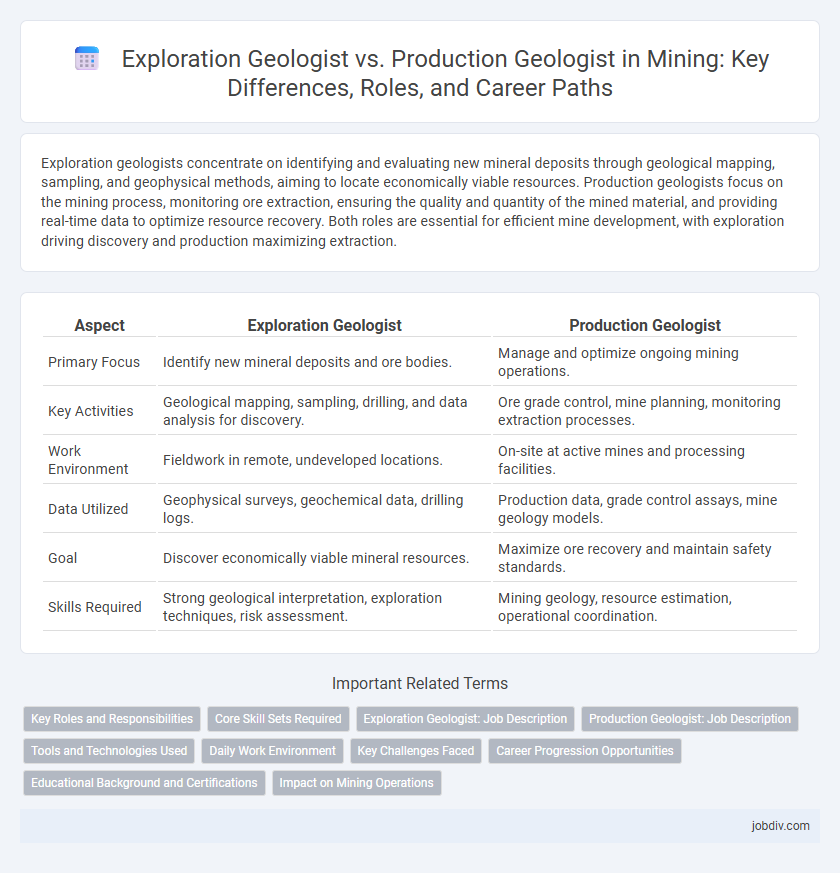Exploration geologists concentrate on identifying and evaluating new mineral deposits through geological mapping, sampling, and geophysical methods, aiming to locate economically viable resources. Production geologists focus on the mining process, monitoring ore extraction, ensuring the quality and quantity of the mined material, and providing real-time data to optimize resource recovery. Both roles are essential for efficient mine development, with exploration driving discovery and production maximizing extraction.
Table of Comparison
| Aspect | Exploration Geologist | Production Geologist |
|---|---|---|
| Primary Focus | Identify new mineral deposits and ore bodies. | Manage and optimize ongoing mining operations. |
| Key Activities | Geological mapping, sampling, drilling, and data analysis for discovery. | Ore grade control, mine planning, monitoring extraction processes. |
| Work Environment | Fieldwork in remote, undeveloped locations. | On-site at active mines and processing facilities. |
| Data Utilized | Geophysical surveys, geochemical data, drilling logs. | Production data, grade control assays, mine geology models. |
| Goal | Discover economically viable mineral resources. | Maximize ore recovery and maintain safety standards. |
| Skills Required | Strong geological interpretation, exploration techniques, risk assessment. | Mining geology, resource estimation, operational coordination. |
Key Roles and Responsibilities
Exploration geologists specialize in locating and assessing mineral deposits through geological mapping, sampling, and geophysical surveys, providing critical data for resource estimation. Production geologists oversee the extraction process, ensuring efficient mine planning, ore control, and real-time monitoring to optimize recovery and minimize environmental impact. Both roles require collaboration to transition discoveries into profitable and sustainable mining operations.
Core Skill Sets Required
Exploration geologists require strong skills in geological mapping, geochemical and geophysical data analysis, and mineral deposit modeling to identify and evaluate new resource targets. Production geologists focus on core skills such as mine plan optimization, grade control, drilling supervision, and real-time data interpretation to maximize ore extraction efficiency. Both roles demand proficiency in geological software, fieldwork expertise, and close collaboration with mining engineers to support sustainable mining operations.
Exploration Geologist: Job Description
Exploration Geologists specialize in identifying and evaluating mineral deposits through geological mapping, sampling, and geophysical surveys to guide drilling programs and resource estimation. They analyze data to assess the potential viability of mining projects, often working in remote locations to collect subsurface and surface geological information. Their role is critical in discovering new mineral resources, which directly influences mine development and long-term production planning.
Production Geologist: Job Description
A Production Geologist focuses on monitoring and analyzing geological data to optimize mineral extraction processes during the mining operation phase. Responsibilities include overseeing grade control, creating ore models, coordinating with mining engineers, and ensuring efficient resource utilization to maximize profitability. Their expertise directly impacts operational decision-making by providing accurate geological interpretations that guide daily production activities.
Tools and Technologies Used
Exploration geologists rely heavily on remote sensing tools, geophysical surveys, and geochemical analysis software to identify mineral deposits and assess their potential viability. Production geologists utilize mine mapping software, 3D modeling technologies, and real-time monitoring systems to optimize extraction processes and ensure operational safety. Both roles incorporate Geographic Information Systems (GIS) and data analytics platforms, but their focus shifts from discovery and evaluation in exploration to extraction and resource management in production.
Daily Work Environment
Exploration geologists primarily conduct field surveys, collecting and analyzing rock samples to identify mineral deposits, often working in remote, rugged terrains with variable weather conditions. Production geologists focus on monitoring ongoing mining operations, analyzing drill data, and providing real-time geological support to optimize resource extraction within active mine sites, typically involving office-based data interpretation combined with underground visits. Both roles require proficient use of geological software, but the exploration position demands extensive travel, whereas production geologists maintain closer collaboration with mining engineers and operational staff.
Key Challenges Faced
Exploration geologists primarily face the challenge of identifying economically viable mineral deposits in complex, uncharted terrains using sparse geological data and advanced geophysical techniques. Production geologists must address orebody variability and ensure efficient, cost-effective extraction while minimizing environmental impact and maintaining safety standards in active mining operations. Both roles require adapting to technological advancements and regulatory changes while managing geological uncertainties to optimize resource evaluation and extraction.
Career Progression Opportunities
Exploration geologists focus on identifying new mineral deposits through geological surveys and sampling, which builds a strong foundation in fieldwork and data analysis critical for advancing into senior exploration roles or project management. Production geologists oversee mining operations and ensure ore extraction aligns with safety and efficiency standards, providing experience valuable for career progression into mine management or operational leadership positions. Transitioning between exploration and production roles often enhances career flexibility and broadens expertise, opening pathways to executive positions within mining companies.
Educational Background and Certifications
Exploration geologists typically hold degrees in geology, earth sciences, or geophysics with specialized training in mineral exploration and remote sensing technologies, often complemented by certifications such as the Society for Mining, Metallurgy & Exploration (SME) Registered Member or Certified Professional Geologist (CPG) credential. Production geologists usually possess similar educational qualifications but emphasize coursework in mine planning, rock mechanics, and ore control, frequently acquiring certifications like the Mine Safety and Health Administration (MSHA) training or specific industry-focused certificates to ensure operational safety and efficiency. Both roles demand continuous professional development to stay current with advancements in geological modeling software, environmental regulations, and resource estimation methods.
Impact on Mining Operations
Exploration geologists drive mining operations by identifying and evaluating new mineral deposits, directly influencing the potential scale and longevity of mining projects through geological surveys and sampling. Production geologists ensure the efficient extraction of these identified resources by monitoring mining processes, managing ore quality, and optimizing resource recovery to maximize operational profitability. Together, exploration and production geologists shape the economic viability and sustainability of mining operations by bridging resource discovery with effective resource exploitation.
Exploration Geologist vs Production Geologist Infographic

 jobdiv.com
jobdiv.com